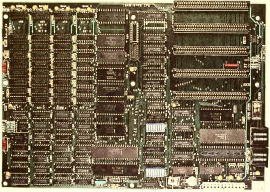GREAT DAY IN THE EVENING © 1996 Ken Knowlton, pictures added 2007
|
Yet another litany of terrible things to come, unless ... ? Not quite. Instead, I attempt simply to present an educated layperson's prediction of what will most likely happen. The big picture. About life and death, civilization and chaos, hope and despair. And a statement about why we should expect the Internet, of all things, to speed us all onward toward unparalleled and unmitigated disaster. Certainly not a picture about what I want, or ever wanted,
to happen; it is simply the future that one should reasonably expect,
judging from how people of power and influence behave. And judging from
how nature works. |
The rainforests are burning — an acre per second, 100 square miles every day. One species of living thing becomes extinct every 15 minutes, 100 species every day. The water table gets deeper than one can afford to pump from, and salt water seeps in at the seashores. The land dries, then washes or blows away. The air becomes more laden with acid, carbon dioxide and methane — the world gets warmer. CFC's, theoretically banned, still climb into the stratosphere and destroy ozone, letting in more ultra violet light. Fossil fuels are used at still increasing rates; the end of the age of oil looms. The oceans — fished by more desperate fishermen, and by high technologies reminiscent of war — are simply running out of fish. Space for living and for agriculture disappears, into airports and highways, landfills and toxic waste sites, cemeteries and ruins, erosion gullies and deserts; even windmill and solar energy farms will take appreciable space. World population increases, at three per second, two million every week. The burgeoning numbers — unless and until cut down by famine or disease or warfare — press ever harder on remaining space, water, flora and fauna. Increasing hoards of the desperate seek, not gently to husband the earth, but shamelessly to stay alive and to feed themselves and their children.
Many effects are permanent, as judged on human timescales. Rainforests turned to agriculture, exhausted in four years, do not revert to rainforests in the foreseeable future; more likely they will become deserts. Oil fields and coal mines do not self-replenish. Even clear-cut forests fail, despite our best efforts, to return to their former states. Radioactive wastes, we might as well assume, remain radioactive forever. Effects may interact and seriously amplify each other. A lowering of stratospheric ozone leads to more ultra violet light killing more of the ocean's phytoplankton, to less absorption by them of carbon dioxide, to even greater global warming. And warmer climates may free much more methane from the now-frozen tundra, leading to still further warming and high-level ozone destruction. Gaia, sufficiently disturbed, cannot be trusted to restore the earth to human livability. There may be a local minimum here and there, like that of a huge beach ball jostled about by the wind in a high mountain valley — yet a sufficient perturbation may thrust our environment into a vastly different quasi-stable state. There have been enormous changes in sea level and ice cover in the geologic past, without human assistance. With our help, drastic changes are certainly possible in sooner than geologic waiting times. Nature will, of course, know what to do in any circumstance. But it follows its own laws of cause and effect, unswayed by people's sentiments, desires, hopes or deities.
Every person seeks first and foremost to attain and preserve and enhance his/her sense of well-being. The momentary goals and means differ from person to person and from time to time, according to Maslovian hierarchies of needs and idiosyncratic value systems. I may or may not understand, and I may or may not delight in, what Sadam Hussein or Mother Teresa or Bill Gates says or does. But I do assume that each of them feels better in some way, or at least anticipates feeling better, as a result of each conscious choice along the way. And so people of power, I assume, act according to some correct and proper ethic; they feel right and delight in what they're doing. And they'll keep doing it until satiated or until they themselves or circumstances change sufficiently to make something else more important. One most peculiar aspect of the display of power is the ostentatious consumption of natural resources, at which Americans excel and their rich excel exceptionally well. It is indeed money, power and influence that govern the big choices facing civilization as a whole. The three and fungible and interchangeable; let us simply use the term "power" for the commodity or quality, unevenly distributed and variously directed, that determines the future. Power is exhibited primarily by government and business, most importantly in the United States, the "leader" of the "free" world. In recent decades, government and business have become so closely allied as to be essentially the same thing. How else can one explain Star Wars, or tobacco subsidies, or deregulation of environmentally-destructive activity? This was not always the case. Earlier in its history, the function of the U.S. government was to provide a haven for the oppressed and jetsam of Europe to come and live more freely (and to oppress slaves and natives). But one is not far wrong these days to assume simply that the interests of government and the interests of business are identical — to establish, preserve, enhance, and enforce the business ethic as the focus of human affairs, the means by which wealth and influence and well-being are distributed or redistributed, the means of determining who eats and starves, who gets medical help or not, who does or doesn't have what kind of a chance at what. We even revel in the folklore of it all. Calvin Coolidge: "The chief business of the American people is business." Charles Wilson: "What is good for the country is good for General Motors, and what's good for General Motors is good for the country." Now, whether or how absolutely power corrupts, as Lord Acton proclaimed, power in almost all of its manifestations does seek to enlarge. Power seeks more power. Its vestments include an extensive self-justifying and self-congratulating vernacular for hiring/firing, for spinoffs/acquisitions, for whatever purposes however discordant: jobs; manifest destiny; the will of God; the American century; leaner and meaner; American competitiveness; God-given; we-owe-it-to-ourselves; the creation of wealth; we owe it to our stockholders. And that one precious and irrefutable non-explanatory explanation: the bottom line. Selfishness and self-aggrandizement, far from shameful, are sanctified in the religion of business.
The "creation" of wealth calls for closer examination. In a frontier society, or in an industrializing epoch, wealth was in truth created. If wood from abundantly lush forests is turned into furniture, humanity is richer by so many chairs and tables. But if a wealthy person forces a family in poverty to sell antique furniture for a song in order not to starve, then what is achieved is redistribution of wealth. In a world in which life, on average, is getting better, wealth is certainly created. But in a world where average well-being is declining, "creation of wealth" is largely a euphemism for re-distribution. Upward — since those who use the term are themselves high up on the feeding chain. The rich get richer, not just while, but largely because, the poor get poorer. It is not uncommon for a CEO to receive 100 times the wages of the lowest paid worker. The mathematician's term for this is "zero-sum" game: whatever I win, someone or something must lose, and vice versa. Actually, in the business world, things are worse than that: so long as I win it doesn't matter to me that others may lose even more. If my business is catching tuna, why should I even care that dolphin lovers are losing the dolphins they love? So the game, no longer win-win, becomes at best zero-sum, more likely negative sum. Strictly equating government with business is, of course, putting things too simply. But government does play, for business, the crucial purpose — of making the center hold. There is a prudent limit to which wealth, power, control and influence can be squeezed upward. If higher society were to become too obviously wealthy, or if distribution of wealth became bi-modal, things would obviously come apart. The function of government, for business, it to adjust the curve of how-many-have-how-much, to keep it smooth so that at each level there are slightly greater numbers just below to compete against and prey upon. This does two things: it avoids a fracture point whereby those below would come into open and vastly destructive rebellion, and it preserves the myth that any appropriately determined and hard-working person can climb through the continuum of opportunity — that is, the myth that those who don't manage to clamber upward have only their own lethargy to blame. In summary: government is primarily the servant of business. Irony of ironies: while the general public is only beginning to realize this grim truth, it is about to become obsolete. Due to modern technology, a business enterprise will not as much need or want its government's help, nor will it as eagerly support its government. Nation states, including the United States, are in serious jeopardy. Patriots simply don't believe this. Cynics and libertarians rejoice. Couch potatoes are oblivious. But this is a fact of the world to come: Nation states are destined to weaken, even crumble. The process and the results will not be pretty. Not at all. 3. The Significance of Information As businessmen and politicians are beginning to know well, this is the age of information, of the information superhighway, of the Internet, of the World Wide Web, the age of cyberspace. The age of computers, of data bases, of communication of enormous quantities (of something or other) at electronic speeds, over world-spanning distances. A computer allows one to gather, store and retrieve information. It permits one to list, collate, compare, revise, edit, merge, extract, search, print and examine enormous quantities of data at unprecedented speeds. Computers connected to one another form the vast information exchange system. By means of these connections, computers and their users, remote from each other, can quickly transmit and exchange small to huge amounts of information — from how's-the-weather-there, to detailed instructions for making oil-and-fertilizer bombs, to encyclopedic tomes. Not all computers need to be attended. Some called servers, attached
to huge databases, automatically perform searches and deliver answers
to remote questioners — in many cases other computer programs — information
about public affairs and historic events, or medical and financial or
other personal information, right or wrong, about almost anyone who
has ever had a social security number, a driver's license or a credit
card, loan, or bank account. Anything that someone might want to know
about. For business enterprises, the Internet is irrepressibly seductive. It presents opportunities for making, executing and revising plans, for transferring assets, reorganizing material and personnel, for diversifying activities, for marketing and advertising, for learning about potential customers and competitors; also for deceit, fraud and subterfuge. And it permits a business to be located practically anywhere, in any connected country.
People do not eat, nor cuddle up to information, nor use it directly to keep warm or dry, nor directly to ward off threatening beasts or microbes. But information does consist in general higher-level descriptions of things we eat, and descriptions of all the other physical things and states of being that very much do matter to us. To business, more than half the "work" involved is typically coping in one way or another with such descriptions. If I make and sell furniture, I need to know from where wood and tools may be available, and whether and how much to trust the suppliers to provide such materials, of proper quality and on time. I need to know who might want to buy my products: when and how and to whom to advertise, and to what degree I can trust prospective customers to pay for things I ship them. I may need to find out how and where I may best recruit workers, where I may be able to buy or rent buildings in which the work is to be performed. And if I don't have sufficient power tokens (information in the form of money) to get started, I may need to borrow them — this I probably do by exchanging further information, including promises or various sorts, with a banker. To be sure, the construction of furniture will consist of applying actual saws, sandpaper, stains, paint and glue to wood. But a very large part of the effort expended on my own part deals with information about physical things and processes, and information about information. I obtain it, store it, retrieve it, copy it, transmit it, sometimes exchanging it for other forms of information, including power tokens. In this age of electronics and computers, information can be handled in unprecedented quantities, with extraordinary ease and speed. In short, all of the informational aspects of business are made not only faster, but they can also be arranged more flexibly. And the arrangements for information processing themselves can change from day to day, even from minute to minute. Separation of objects and information takes many forms, some quite novel. Thus, people with medical problems may be the objects at issue, and distant specialists in medical conditions and procedures may be consulted — not by meeting with the patients but by receiving video pictures, charts, and other relevant data by various electronic transmissions — replying similarly by transmitting their voices, sketches, etc. Sometimes information processing and transmission itself is the end product of a business, as in connecting persons physically distant so they can communicate, or in entertaining people by displaying to them interesting sequences of sights and sounds. The Internet, widely celebrated, inaugurates the "global village" in which anyone, anywhere, can be brought into instant communication with anyone else. Universal connectability also is claimed to portend global "democracy," though voting per se in not exactly the issue. In any event, there are no longer national, hence repressive, barriers to the flow of truth about things good and bad, happening here and there. The truth, of course, will set us free.
Much is made these days of the "virtual" office, virtual conference, and virtual presence of all sorts of people and things. The byword is: send the bits (descriptions), not the atoms (things). Let's have a meeting of people who are actually in four different cities as if they were in some imagined place together — by presenting televised presences of each to the others. Let's agree upon issues, place orders, set prices and delivery schedules, sign documents, transact every kind and manner of business dealing. So long as we need not whittle simultaneously on the same block of wood (you affixing the hinge while I put in the latch) we need not be in each other's physical presence. Moreover, people with special skills and particular roles, even computer programs, may join and leave the meeting as their input and abilities are needed, or as we need to issue directives to them. Flexibility and speed are thus enormously enhanced, including immediate access to unanticipated data that suddenly becomes relevant. Such is the speed and power of the electronic computerized world of search and transmission, of processing and storage and retrieval of information. In order properly to take advantage of such speed and power, of course, a business enterprise must clarify and enforce a clear distinction between data and physical objects (including people). But once these methodologies are in place, extraordinary efficiency, competitiveness and agility are at hand. And the very structure of the business enterprise itself may be expressed as so much information, about its personnel and assets and their relationships, options and responsibilities. What's important about a business entity, so far as it deals with the informational aspects of its realm, internally, is the interaction of its parts and, externally, its total behavior toward the rest of the world. It matters not where it is (if it can be said to "be" anywhere) and it matters not who it comprises (if indeed it is the putative separate unique extant people who in fact do the negotiating, thinking, and decision making on behalf of the business). For that matter, one or another "person," as viewed by the outside world, may be another guise of someone elsewhere on the roster, or on other boards of directors, or it may even be a cleverly designed computer program.
There is as great downside to this great new world, with many facets, including: (1) personal privacy is deeply threatened, (2) things or people may not be what or who they seem to be, (3) any person or computer program may be snooping, listening in and even tampering, and (4) governments, anxious to collect taxes and defend against threats will use progressively repressive measures to track progressively elusive activity. A word on each in turn: (1) Everyone already expects that a computer-literate database-savvy person can retrieve volumes of personal information about anyone. Year by year, we should expect additional private data to become essentially public, such as peculiarities of our DNA, or the daily, weekly and yearly driving patterns for our personal cars. (2) We have been alarmed or amused by a person falling in love, through
electronic conversation, with someone who turned out in reality to be
50 years older, and of the opposite sex, than pretended. Regarding financial
transactions, there arise new and more extensive opportunities for posturing
and masquerading, for deceit and fraud. Misinformation (accidental)
and disinformation (deliberate) travel just as far and as fast as truth. (4) The flow of information is little hindered by national boundaries; it therefore threatens political empires and national hegemonies. Nations fight back, trying to prevent communication that they cannot listen in on and control. A struggle is raging between privacy and control; the forces of repression have not yet lost the battle, and no one can be sure that they will not decisively win — perhaps in Singapore or China or North Korea. Maybe in the United States. On the other side of the battle, strong encryption is the best help unless or until outlawed. Many of these troubles have been addressed, and presumably solved, by (of course) technological fixes. Messages are encrypted, verbal and financial transactions are split into minute pieces which are variously transmitted to be re-pieced together. Means are devised for authenticating that the person communicating to me is indeed who he/she proclaims to be; likewise I have methods of proving that I am in fact who I am asserting myself to be. My own computer and files are protected against intrusion and sabotage by a variety or defenses, and keys and passwords protect my computer and my programs from being run by others without my permission. But codes can be broken, Internet traffic can be analyzed, passwords can be guessed, intrusions and impersonations can and do succeed, by stealth, by yet greater cleverness, sometimes by dumb luck. Sinister snippets of software can be gratuitously and secretly thrust into my computer by a number of means. One can never be sure about security. It is largely a question of how much money and effort a person, group or government can afford to spend. It may be deemed only moderately important to track ivory, but very important to track uranium, plutonium and electronics from dismantled Soviet nuclear weapons. Thus arms smugglers will presumably use particularly devious and secure means of communication, whereas their would-be apprehenders will bring out their own big guns of analysis. The interlocked games of encrypting-vs-decrypting, of protecting-vs-penetrating, of hiding-vs-finding, of masquerading-vs-exposure, spiral without limit. The only general thing one can say is that either side can win any of these contests, and it's likely but not certain to be the one who expends greater resources in the contest. (One of the more vexing sorts of trouble will arises from anonymous delinquents whose purpose is not to advance a known political cause, but simply to perplex and destroy. Phone systems, power grids and transportation systems lie in extreme jeopardy because one doesn't know from whom, or when or how such havoc may arise. Preparations for any such attack can be done very quietly, and they can be incredibly extensive. The only, and partial, defense would seem to be extraordinarily repressive, complete-as-possible surveillance and encryption of all electronic communication.) One of the best ways to spend your money in this battle, of course, is to plant a mole. With sufficient advance planning, your imposter can be a programmer on your adversary's staff who can insert many of several kinds of deviltry, e.g. Trojan horses or logic bombs or time bombs. (A Trojan horse is a secret entry point or method by which an outsider who knows the secret can gain access; a logic or time bomb is something that is engineered to misbehave in a certain way when its specified condition is satisfied, or its time has come, respectively). One can easily imagine, for example, a pernicious time bomb arranged to trigger at the switchover from the year 1999 to 2000 — compounding the effect of the innocent mistakes that are already anticipated to cause great trouble because so many year-specifying data fields have been allotted only two digits.
Almost any business can go international, in particular because the Internet makes all of its informational aspects relocatable, at minimal cost. If I need someone to transcribe hand-written names an addresses, I can as easily and as quickly have the job done by the most desperate capable person, in Mexico or Brazil or wherever. Countries and their businesses will decouple, thus leaving each country in peril for two obvious reasons: it will harder to extract taxes from business activities "within" the country's borders, and it will be harder to monitor and control those activities. Of course, some part of business activity will always deal with physical things. People will still eat real food, wear real clothes, and burn real fuel, all made of atoms. Yet anything smaller than a breadbox can easily be made in, and shipped from, a sweatshop anywhere in the world. Many businesses themselves may become short-term, essentially fly-by-night. The rewards will be to the clever, the fast, the persuasive, the devious, the untrackable; to unidentified opportunists, conspirators and colluders, in undiscoverable places, dealing in mislabeled goods, operating in underground economies. The question is not whether their activities are illegal or immoral, but whether there can be applicable laws, for appropriately defined jurisdictions, with authorities empowered and able to detect misdeeds, and to apprehend and prosecute the perpetrators. Judging from the time and effort spent here or there to find a single scoundrel on the Internet, its hard to feel sanguine about the issue. There are no adequate precedents nor are there expectations for the degree of internationalization of business that we should rightly expect. It's hard to say what sorts of controls there should or even could be for governing its flow. Information is intangible; you can't say where it is, how much who has, and how much it is worth, or whether its worth at any place is increasing. Why should we expect significant international regulations are even possible? Weakening national governments will not have the will or energy to agree on and support them. We would need, at best, to look to the big foxes of international business themselves to police the frantic henhouse. Both the main financial support of each nation state, and the state's primary reason for being, whither. Those of us in the U.S. should not be smug in our cocoon of "freedom and democracy." We might even suspect that our own country's serious decline has been scheduled for the first decade of the next millennium, when the Social Security, Medicare and national debt burdens reach a collective breaking point. The reason not to have been informed of this, one might suppose, is to preserve a sense of normalcy so that business can, for a few more years, concentrate on shorter and shorter term gains.
The goal, for each participant in the coming free-for-all, remains as before: to amass wealth and power. Computers and networks make the game faster paced, more intricate and more devious; they do not change human nature. Anyone can play; you need either computer smarts or the ability to pay someone who has them. But the total result will be a wild and crazy scramble — essentially ungoverned and unregulated trade, piracy and mayhem. Just as there is little cohesion in the United States — because we are so short on long-term shared traditions, language, culture and values — on the world scene there is even less common ground. We might have hoped for a moral or religious basis for setting guidelines of behavior and expectations of each other. But that simply is not the way the business world works. It doesn't even pretend to. It plays hardball. How the scramble will play out, we simply cannot say. We can at best seek insight from the histories of war, business, advertising, finance, nationalism, sedition, piracy, secession, religion, industrial espionage, intergovernmental espionage, industrial sabotage, international sabotage, hoodlumism, pranksterism, terrorism, gangsterism and fanaticism, and hostage-taking; also from the current state of knowledge of personal psychology, group psychology, computer science, cryptography, mathematics, ethics, law, economics and ecology. The saddest and most devastating result of the scramble will be the sheer amount of human time and energy spent on the game of wealth and power, an unprecedented and gargantuan expenditure and waste of resources. Meanwhile, back at the ranch ...
The rainforest is burning, species are becoming extinct — even tigers and rhinoceroses. Frogs, which have been around for 100 million years, have been disappearing, and we don't know why! Perhaps frogs are non-essential to human pursuits. But think of our state of desperation if pollinators began to disappear as dramatically, and for reasons so little understood! The land masses become deserts, the oceans become sewers, and the population relentlessly expands. Of course, something big will indeed happen regarding population — we just don't know what or how soon. So many kinds of catastrophe are possible that each of us may as well choose at random from appropriate near-future science fiction scenarios. The only thing absolutely certain is that there will be appalling misery and death. Not immediately for everyone. Winners of the power game may indeed be best off, for a limited time in survivalist-style hideouts or on island fortresses, with a several-year supply of food, medicine and fuel. This is the point for the deus-ex-machina solution, for my little sermon about what we absolutely must do before it's too late. Regrettably, it is indeed too late. Absolute disaster will come. For those in power do not slow down or back off. Instead, they seek shorter and shorter term personal gains. They pursue their goals ever more fiercely, and are ever more wasteful of human and natural resources. The juggernaut of greed has vastly too much momentum for anyone or anything to change its course. And our wonders of modern electronics have only added to its speed. One not unreasonable response is first anger at the wealthy and powerful, then terrorist rage against them. But terrorism is not even wrong in the situation; it is superfluous. The entire system is set to self-destruct. Is the Cousteau Society irrelevant? Greenpeace, Audubon Society, and Worldwatch Institute? Not exactly. They are admirable tributes to the human spirit, to the valiant fight, too late, for a world that might have been. They represent the quixotic best of our grand and sorry lot. Similarly for religious stances in the face of doom. Faith and hope give us the serenity to accept what we cannot change. But they have interfered terribly with progress toward changing those things that we might have done something about, most notably population. Under the circumstances, any answer to "What to do?" must be personal. We face an eschatological issue, a true doomsday prospect that must be met by each from his/her own standpoint. My own personal "answer" to the great problem is, first, to admit that civilization is indeed coming to either an end, or to such an incredibly rough time that there is no possible way of seeing through to the other side. Such total havoc and savagery lie ahead that there may be only a few years, at most decades, of time for sane behavior. Secondly, what to do with the remaining time? My own answer is to take stock, to review, to write, and collect my own idiosyncratic pictorial history of civilization.
It's been one helluva ride. Civilization. Only about 5000 years in all, barely one millionth(!) of the age of the earth. Yet it has been a story huge and momentous beyond any possible telling of it. No opera, grander than life though it be, can encompass it, no art nor literature can hardly begin to recount the joy and pain, the agonies and aspirations, the strivings and untimely deaths. Achievements galore against all odds. Failures, and tragedies, some almost averted but for perverse details. Myths, legends, religions, folktales, music and dance, hopes and dreams. Cathedrals and monuments, pyramids and tombs. Whole cities built, and sacked, and refurbished, and destroyed, and rebuilt. Then re-destroyed and rebuilt; or re-destroyed and abandoned. Skyscrapers, bridges, atom smashers, satellites flung from the solar system itself. Attempts to encompass the full drama must fail, but I rejoice in any such endeavor. One of the singularly poignant tragedies in history has been the loss of the library at Alexandria — the disappearance of so many scrolls recording science and math, myth and culture up to that point. One last gesture for us might be similar collections, in this case a deliberate summation — some set of repositories of records, in some form, of all that we humans have held dear. For whom or what? Possibly for a resurgence of the human race. Maybe for another intelligent species that may evolve from our wreckage, a few million years hence. Possibly to be discovered by a robotic spacecraft from another planet, to be analyzed, reduced to almighty bits, and transmitted back home. Where to put the stash? Mountaintops, caves, landfills, cemeteries, and — with sufficient help from eccentric friends — into orbiting museums. Perhaps there should be levels of security so that discoverers must demonstrate that they value what they're finding before being admitted to the real goods. So here's my own final tribute to the sublime, the pedestrian and the ignoble seasons of the human soul: I collect. Especially pictures. The personal payoff is that I learn more about who and what I am — by noticing more clearly what I value. It's also my way of living more lifetimes, by adding, and sometimes vicariously experiencing, other peoples' foci for time and energy spent. Anyway, this is my own answer to what-to-do: It's time to cry. Especially for my children and grandchildren. Then to collect, to ponder. And to stash.
|







